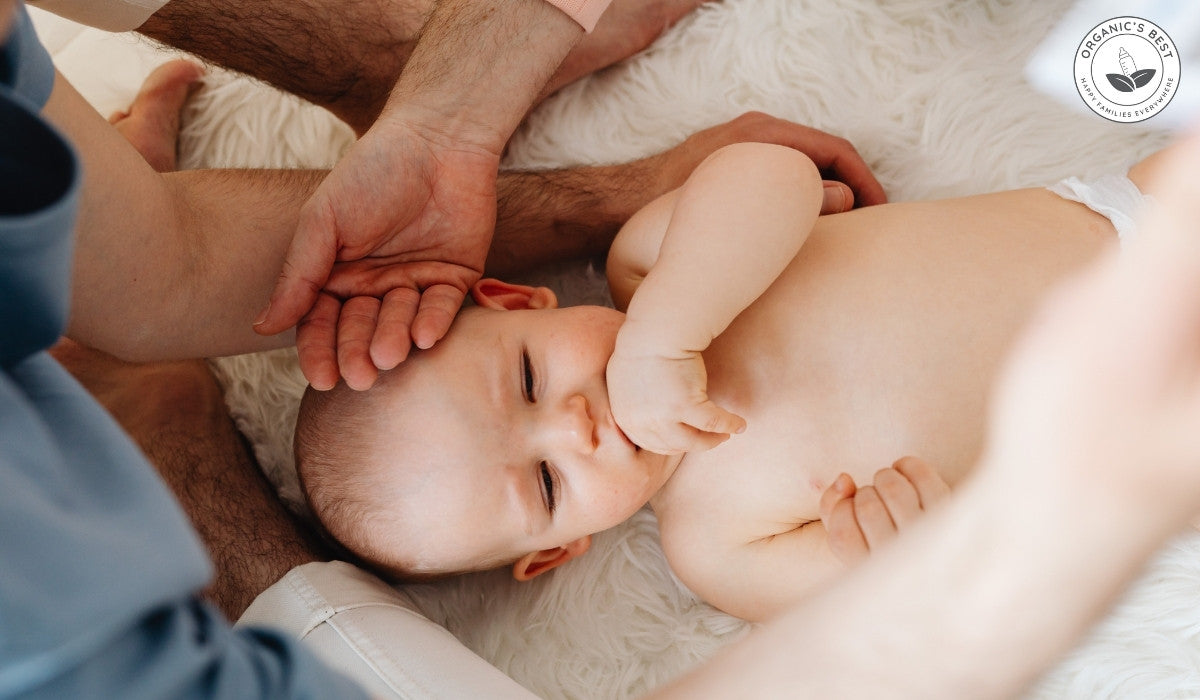Click to Get 2 FREE Boxes/Cans
Only New Customers! Click HERE to Get 2 Extra Boxes/Cans for Free With Your First Order.
BABY FORMULA
Offering new parents top-quality European infant formula from renowned brands like HiPP, Holle, Kendamil, and more. If you’re uncertain about which product to choose, our Formula Finder can help you make the best decision for your baby.
Baby Food
Offering new parents a premium selection of European baby foods, including jars, pouches, cereals, and snacks from esteemed brands like HiPP and Holle.
Gassy Babies: Infant Gas Causes, Symptoms and Relief Methods
by Agustina Fernandez August 16, 2022 10 min read

Table of Contents
If you are reading this, there's a good chance that you either just welcomed a new baby into the world or you have a little one on the way. In the beginning months, there are so many milestones to look forward to, but there will likely also be a few learning curves for you and your baby.
Your baby's little body needs to learn the ropes of life outside of the womb, and as a parent, you need to learn how to care for this new human life. For many babies, this adjustment period involves some gas, as their digestive systems work hard to strengthen and adapt to the new substances entering their tummy.
Many babies struggle with gas at times, some worse than others, but there are a few ways to reduce the severity and ease discomfort. Keep on reading for information on the main causes of gas and how to relieve a gassy baby.
Why is My Newborn so Gassy?
Having gassy newborns is not often a cause for concern, as gas is a normal function of the digestive system. When we eat, the food travels through our gastrointestinal tract, and all the ingredients that the small intestine isn't able to absorb are broken down by bacteria in the large intestine.
This process releases hydrogen and carbon dioxide, which produce bubbles of gas. Burping can usually help your baby release some air from the stomach, but the rest moves to the colon, which is how gas builds up.
Babies, however, are still developing, and given their underdeveloped digestive systems, gas doesn't always pass easily, which can cause discomfort. Another reason that your little one may be gassy is that babies tend to take in air during bouts of crying and while feeding.
Infant gas is completely common and is usually outgrown by the end of your baby's newborn stage (typically their first three months of life), but in some cases, it can last beyond their fourth and sixth month of life.
Now that we know why babies get gassy let's look at what usually causes gas in babies, how to know when there is something more going on, and how to help soothe a gassy baby. If your baby's gas is extreme, persistent, and doesn't seem to subside through different gas relief techniques, it would be best to contact your child's pediatrician.
Symptoms of a Gassy Baby
As mentioned earlier, it is perfectly normal for your newborn baby to have gas. However, there are signs and symptoms to look out for that may indicate something more is going on that is causing the gas.
Signs to look out for that your little one is struggling with gas include:
-
Having trouble eating or sleeping
-
Intense crying
-
Increased irritability or grumpiness
-
Appears to be in pain or uncomfortable while crying
-
Very squirmy

Having Trouble Eating or Sleeping
Your baby seems to be having trouble eating or sleeping, and although there could be a number of causes for this, gas pain could be one of them. You might want to call your doctor to make a better assessment, especially if your baby seems to be particularly uncomfortable after eating.
Intense Crying
If your baby tends to be fussy for up to an hour or so each day and their excessive crying doesn't seem to show any signs of improvement, it might indicate that they are experiencing a level of gas that exceeds the normal amount of infant gas.
Increased Irritability or Grumpiness
If your newborn seems unhappy or grumpy most of the time, this could indicate an abnormal level of gas.
Appears to be in Pain or Uncomfortable While Crying
Babies cry for a variety of reasons and most are completely harmless and easily resolved. However, if your newborn baby gets red in the face when they cry and the crying is persistent, it may indicate gas pain, and they may need a little extra help relieving the pain. A baby in discomfort may pull away from the breast or bottle, arch their back, or cry.
Very Squirmy
If they seem particularly uncomfortable and you notice them pull their legs up to their chest or squirm frequently, it can indicate that there is gas that is not easily passing.
What Causes Gas in Babies?
If your baby starts showing visible signs of discomfort when they pass gas, it is important to look closely into what is causing the painful gas.
Here are some of the possible causes of gas pains:
-
Air swallowing
-
Underdeveloped digestive system
-
Minor digestive problems
-
Food sensitivities
-
Baby's diet
-
Gastrointestinal virus

Air Swallowing
If your baby were to swallow air, this could cause your baby to be gassy. When your baby eats or while they cry, they tend to swallow a lot of air, and too much air can lead to a buildup of gas.
Learn more: Best Bottles for Breastfed Babies
Underdeveloped Digestive System
When food goes down their digestive tract, the infant's immature body might still be unable to break down food completely, causing young babies to pass too much gas.
Minor Digestive Problems
Constipation and gastrointestinal conditions, such as acid reflux, may explain why your baby has gas.
Food Sensitivities
Studies suggest that there might be a correlation between a gassy baby and the parent's diet. Breastfed babies can be hypersensitive to foods found in the mom's diet. Before becoming alarmed and reforming your whole meal plan, make sure you try some of the home remedies we propose.
If your baby's gas persist, and you notice that every time you eat a certain type of food they seem gassier or fussier than usual, you could try cutting that food from your diet to see if it helps.
Work with your doctor to nail down foods that might make breastfed babies gassy, which may include:
-
Cruciferous vegetables like cabbage, Brussels sprouts and cauliflower
-
Dairy and eggs
-
Meals that contain a lot of spice, onions or garlic
-
Fried foods
-
Beans
In other words, all of those harder-to-digest foods that trigger gas in you could also trigger gas in your child. The gas-causing food you eat ends up in your breast milk, which might mean extra gas for your little one.
Baby's Diet
In the case of formula-fed babies, certain types of formula or, in less rare cases, food allergies or intolerance may be causing the gas. If your baby has skin rashes, vomiting, diarrhea, or blood in their stool, this could be an indicator of a food allergy, in which case it is best to consult your child's pediatrician.
When your infant gets older and eats solid foods, the introduction of products that they might be sensitive to could be the reason why your baby is gassy.
Gastrointestinal Virus
In some rare cases, the baby's gas may be caused by a virus. If you are concerned that your baby has a virus, it is best to call their pediatrician and explain your concerns.
What's the Best Infant Formula for a Gassy Baby?
Bottle fed babies pass gas just like any other infant, but if you suspect that your child has more gas than usual you may consider introducing them to a new formula. If so, please make sure to speak with your pediatrician before switching formulas, and if a new formula is advised, do so gradually over a few days to allow the baby’s gut time to adjust.
There are a few types of products on the market that tend to be gentler on the tummy and work wonderfully for babies who are prone to gas. If your baby is in good health overall, products that have hydrolyzed proteins may help alleviate digestive discomfort.
Goat milk formulas are also a good choice as they have simpler proteins that are typically easier to digest. There are also a number of specialized formulas on the market that target specific digestive issues.
These specialized formulas contain different carbohydrates and proteins that could work better for gassy babies:
-
Hypoallergenic formula: The proteins (casein or whey) contained in this product - also found in milk - are broken down into easier-to-digest proteins.
-
Lactose-free formula: In rare cases, some babies cannot digest lactose, so this formula type replaces it with naturally occurring sugars found in foods, like sucrose and glucose.
-
Baby formula for acid reflux: This helps babies that tend to vomit after feedings, given its thicker consistency compared to regular formula.
If you are interested in trying a goat's milk formula or a formula with hydrolyzed proteins, we have some great options:
-
Holle Goat Milk formula: This product is made with smaller fat molecules and less lactose for easier digestion.
-
HiPP Comfort formula: This product contains hydrolyzed proteins and has less lactose, which may make it easier to digest.
-
HiPP HA Hypoallergenic formula: This product contains hydrolyzed proteins and contains natural probiotic lactic acid cultures extracted from real breast milk.

The Difference Between Regular Infant Gas and Colic?
Gas and colic are not the same thing, but they can cause similar symptoms. Because of this, you might mistake your gassy baby for a colicky baby. Scientists are still researching the direct causes of a colicky baby, but it is certain that they go beyond an immature digestive system. Even though gas doesn't cause colic, gas pain can make a colicky baby feel even worse.
Colicky babies can be especially hard to soothe; they go through long periods of excessive crying, especially at night. Colic usually appears in the first few weeks of life of a baby and will subside by the time they reach three or four months old.
Before jumping to conclusions, remember that the best way to accurately determine whether your infant has colic is to contact your pediatrician.
You can also check our Best Formula for Gassy Babies collection page to have more information!
Baby Gas Relief Methods
There are a number of simple home remedies that you can try to alleviate infant gas and release the gas buildup in your newborn.
Here are some of the home remedies that are known to help relieve gas pain:
-
Move your baby's legs in a circle
-
Tummy time
-
Baby massage

Move Your Baby's Legs in a Circle
Baby bicycles are simple exercises that can help your baby release gas. All you have to do is lay your baby on their back and delicately cycle their legs in a bicycle motion toward their tummy to manually help squeeze out trapped gas.
As an alternative, you could gently push your baby's knees towards their tummy and hold for up to 10 seconds then release and straighten their legs. Repeat multiple times as needed.
Tummy Time
Tummy time is important as it strengthens your baby's neck and back muscles, preparing them for when they'll start to crawl and walk. It is also perfect for providing gentle pressure on the baby's tummy, which can also help with baby gas relief and clearing the baby's digestive tract.
Since some babies spit up if you put them on their tummies right after they eat, it is advised to avoid tummy time soon after you feed them. It is best to wait at least 20 to 30 minutes.
Always supervise your baby during tummy time and never put your baby to bed on their stomach, as it increases the risk of sudden infant death syndrome (SIDS).
Baby Massage
Baby massage is another way to help with your baby's gas pain. Gently massaging your baby's stomach in a clockwise motion is useful for relaxing the baby enough for passing gas. After massaging their tummy, continue to the rest of their bodies - back, shoulders, legs.
Baby Burps
Swallowing air is among one of the reasons why your baby has gas. They tend to do so while they are being fed, as there can be a lot of crying, devouring, and breathing in air quickly and deeply. All this swallowed air can turn into gas. To help prevent a buildup of gas, burp your baby by also gently patting their back more than once during feedings.
Additionally, bottle-fed babies can ingest a lot of bubbles, so to prevent this, you may want to tilt the bottle at an angle that fills the entire nipple with milk.
Baby Gripe Water
This liquid supplement, known as baby gripe water, is a blend of sodium bicarbonate and herbs (like fennel, ginger, and chamomile) that can provide natural relief for a gassy baby. Although there is no evidence that gripe water soothes fussy babies, the American Academy of Pediatrics (AAP) believes it’s a safe option to try, although it is best to check with your doctor to be sure.
Probiotics
Probiotics are known for the ways they support your gastrointestinal system and are naturally found in fermented foods like kimchi and yogurt, as well as in supplements and formulas marketed for tummy troubles in babies. Research has found that probiotics may help reduce gassiness, likely by supporting gut health. While probiotics are generally considered safe, make sure to talk to your doctor before giving your baby any probiotic product.
Baby Drops
Although baby drops are not scientifically proven to help relieve gas, if you are out of options, they might be worth trying.
As a precaution, consult with your doctor prior to giving your baby gas drops. Look for those that contain Simethicone, which is considered safe to use. Avoid drops that contain sodium benzoate or benzoic acid, as those ingredients can become harmful to your baby when given in large quantities.
The Best Gas Prevention Methods for Gassy Babies
Feed in Upright Position
Whether their meals come from breast or bottle feeding, try feeding your baby in an upright position to reduce the amount of air they swallow, as your baby's feeding position is a top priority to understand. If you’re breastfeeding, be sure your baby is properly secure.
In the case of bottle-fed babies, try anti-gas or a slow-flow nipple and bottle, which can change the flow of milk and help reduce the amount of air your baby swallows. Be sure that the nipple is always completely full of milk so your baby doesn’t chase formula with air. It is also recommended to avoid shaking the bottle too much, which can add extra bubbles to the milk.
Feed Baby Before Meltdowns
Crying is not always predictable — especially in newborns. Although, the more your baby cries, the more air they will swallow (and the more gas they will have). So, as much as possible, learn the early hunger cues in your little one and feed them accordingly.
Signs That It May Be More Than Just Gas
It’s always a good idea to consult your pediatrician whenever you are worried about your child's well-being, even if it might not seem like a big deal. We advise you, however, to call your doctor right away if you notice that your baby's gas symptoms are accompanied by any of the following:
- constipation
- diarrhea
- blood in their stool
- fever
- vomiting
- loss of appetite
- weight loss
- allergic reaction to foods
- infection
- celiac disease

Disclaimer:
Please be aware that this information is based on general trends in babies, and it is not medical advice. Your doctor should be your first source of information and advice when considering any changes to your child’s formula and when choosing your child’s formula. Always consult your pediatrician before making any decisions about your child’s diet or if you notice any changes in your child. Breastfeeding is the best nutrition for your baby because breast milk provides your child with all the essential nutrients they need for growth and development. Please consult your pediatrician if your child requires supplemental feeding. |
Agustina Fernandez
Dr. Agustina Fernandez earned her medical degree from the prestigious Universidad Nacional de Córdoba, Argentina. With a deep-rooted passion for pediatrics, Dr. Fernandez is currently on the path to specializing in children's healthcare. Recently, she has delved into the vital field of infant nutrition. Her research interests include breastfeeding, infant formula, and baby food in little ones’ formative years. Dr. Fernandez's commitment to this area of study underscores her dedication to ensuring the health and well-being of children from their earliest days.
Leave a comment
Comments will be approved before showing up.
Also in Organic Infant Nutrition and Health Blog

10 Winter Activities for Kids and Toddlers
by Agustina Fernandez January 06, 2026 8 min read
Read More
How to Choose The Best Infant Formula: A Guide to EU Organic Formulas
by Agustina Fernandez January 05, 2026 14 min read
Read More
Best Formula for Breastfed Babies 2026 Guide
by Agustina Fernandez January 05, 2026 15 min read
Read More
Reviewed by Dr. Bardha Citaku, MD
-

Dr. Bardha Citaku: Medical Reviewer of Organic's Best Blog
Dr. Bardha Citaku completed her medical studies at the University of Prishtina in Kosovo, where she began her journey into the field of medicine. She has since developed a career in medical research, contributing to projects with notable organizations, including the World Health Organization (WHO).
